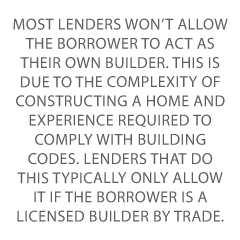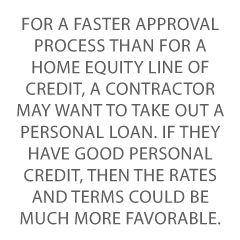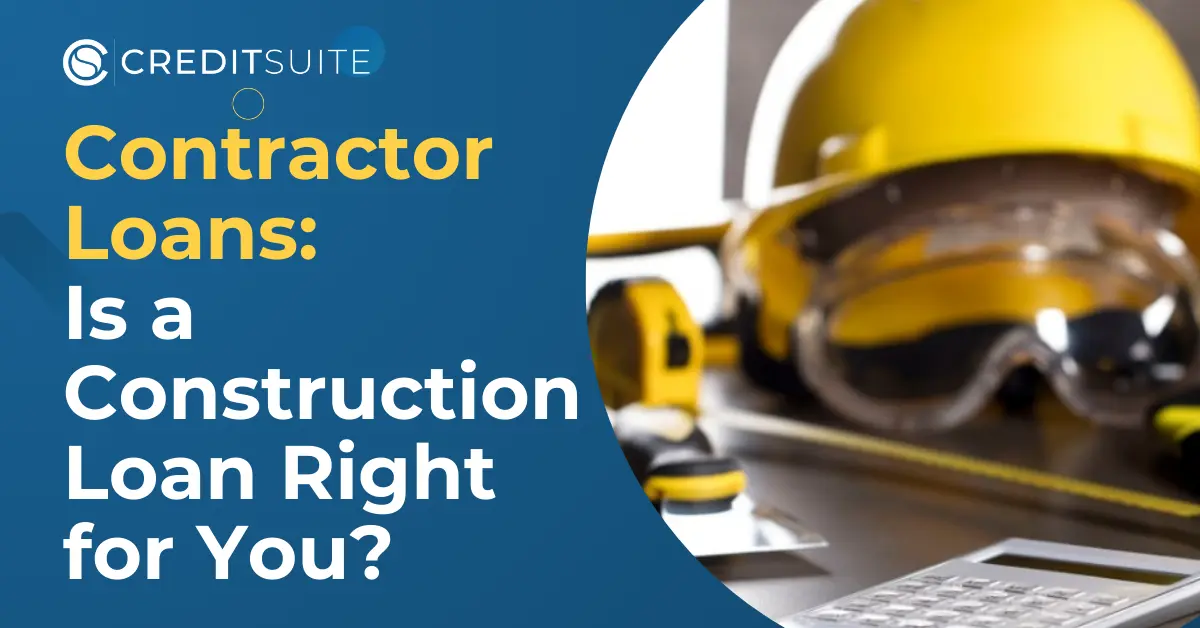Whether you’re an old pro or a newbie contractor, contractor loans can finance your small business. Also called a construction loan, it’s business financing to build a residential property. It tends to be for a short term and a higher interest rate.
Contractor loans are for new construction and not renovations on preexisting dwellings or other structures.
What is a Contractor Loan?
These construction loans are often business financing for the purpose of constructing a new residential property. Borrowing the money to pay for such a project is different from getting a mortgage to move into an existing property.
A home construction loan is a short-term, higher-interest loan. It provides the funds required to build a residential property.
Construction loans tend to be one year in duration (less than an SBA loan). During this time, the property must be built and a certificate of occupancy should be issued.
These are not loans for the renovation of buildings that already exist. It is only for new construction.
Unlike a mortgage or a traditional bank loan, a construction loan is paid out in stages as the new home construction progresses. Often, these draws will happen when major milestones are completed. For example, when the foundation is laid or the start of the framing of the house.
With a construction loan, you are generally only obligated to pay interest until construction is completed.
As part of construction loans, the bank or other lender will have an appraiser or an inspector check the building during each construction phase. If the appraiser approves of how the building is progressing, the contractor will get a draw of the money.
Often this means four to six inspections per building.
What Can a Contractor Loan Be Used For?
Unlike a home equity line of credit (HELOC), personal lending, a standard small business loan, or a business credit card, there are restrictions to what a construction business can do with construction financing.
Standard construction loans are only for new construction. But there are a few other kinds and those do include renovation loans.
Many of these loans are best used to cover up-front expenses. They prevent the kinds of cash flow shortages a contracting small business may experience when waiting until three months after construction project completion to get paid.
However, there are other uses for construction loans.
You can also use a construction loan to cover:
- The cost of real estate
- Contractor labor
- The construction cost of building materials
- Necessary permits
And depending on the loan’s restrictions, construction loans may even be used to cover:
- Payroll
- Insurance policy costs
- Any unexpected project complications
- Bidding on new projects for the future
- Getting bonds to cover potential issues
- The purchase of new equipment (or the updating of older machinery)
Ultimately, you will need to speak with your lender about what is included in your loan-to-value calculation.
It is possible to include permanent fixtures like landscaping and appliances in your loan-to-value calculation. However, you cannot include furnishings in the calculation of independent contractor loans. A contractor looking to sell a furnished dwelling will need additional financing.
A fixture is a more permanent part of a house. Carpets are likely to be considered to be fixtures, whereas rugs (which can be pulled up and removed) would not be.
Types of Loans For Contractors:
There are several types of loans and these include lending for homeowners who are also contractors.
Type 1 – Equipment Financing
Equipment financing is a loan where equipment serves as collateral. It is often financing for purchasing that equipment or leasing it.
Equipment financing is particularly helpful for contractors who do not have good personal credit and cannot prove a significant amount of time in business. The main thing the lender is interested in is the value of the equipment.
As a result, equipment financing can be a good choice for startup construction companies. With credit score requirements as low as the mid-500s,
This form of financing is for large pieces of equipment which will retain their value, such as trucks and backhoes, but also office furniture and computers.
Type 2 – Owner-Builder Construction Loan
These are construction-to-permanent or construction-only loans where the borrower also acts in the capacity of the home builder. In a way, the home buyer will need to behave like a general contractor.
This means the buyer will need to schedule all independent contractors logically so that framing and windows do not happen until there is a foundation.
Most lenders won’t allow the borrower to act as their own builder. This is due to the complexity of constructing a home and the experience required to comply with building codes. Lenders that do this typically only allow it if the borrower is a licensed builder by trade.
Type 3 – VA Construction Loan
For contractors (and owners) who are veterans, a construction loan from the Veterans Administration can be another viable financing option. The builder will need to be approved.
Personal credit approval requirements are often at least low 600s.
You’ll need to have a debt-to-income ratio of 41% or less to get most VA loans, although there are circumstances where that requirement is waived (if you have tax-free income, for example).
In addition, using a formula based on your home’s location, the size of your household and other factors, you need to show that you can handle your loan payments with your residual income
Residual income is what you have left after you pay other debts and home maintenance costs.
Type 4 – Construction-Only Loan
With this type of loan, the borrower must repay the loan in full at maturity (typically one year or less) or get a mortgage to secure permanent financing.
Construction-only loans can ultimately be costlier. This is if you will need a permanent mortgage and it is because you complete two separate loan transactions and pay two sets of fees. Closing costs tend to run in thousands of dollars, so it helps to avoid another set.
If a borrower falls upon hard times during construction, they may not be able to qualify for a regular mortgage once construction is completed.
Type 5 – Construction to Permanent Loan
In contrast to construction-only loans, a construction-to-permanent loan includes a mortgage. That’s permanent financing. Once construction is finished, the loan converts to a mortgage. It can be at a fixed or adjustable rate.
These are less expensive than construction-only loans, as the borrower will only have to pay one closing cost.
You can even get this type of financing from the FHA (like an FHA 203k loan), an equal housing lender.
A permanent mortgage is virtually identical to any other housing mortgage, usually with repayment terms of fifteen or thirty years. Once the loan becomes a mortgage, the borrower pays both interest and principal.
Type 6 – Short Term Business Loan or Business Line of Credit
An independent contractor in the construction business may be able to get a small business line of credit or a more traditional term loan.
These types of independent contractor loans will have qualification requirements similar to any other construction business loan. An independent contractor will most likely have to either offer up collateral or prove their cash flow (perhaps via merchant services).
Or, if they have good credit, particularly through managing at least one business credit card, demonstrate as much to a lender. This means they should build business credit.
If the contractor does not own the property, then they cannot use it for collateral. As a result, they would have to use equipment or the like.
Type 7– Personal Loan
 For a faster approval process than for a home equity line of credit, a contractor may want to take out a personal loan. If they have good personal credit, then the rates and terms could be much more favorable.
For a faster approval process than for a home equity line of credit, a contractor may want to take out a personal loan. If they have good personal credit, then the rates and terms could be much more favorable.
For a contractor with very little built-up equity, such a loan will likely be easier to get. However, the downside to such a loan is the money drawn is against the borrower’s own funds. If they default, they will have to pay out of their own pocket.
In contrast, a HELOC is drawn against home equity and is limited by how much equity you have built up.
General Requirements for Contractor Loans
Lenders that offer construction loans often require borrowers to have financial stability. For a construction loan, you need a low debt-to-income ratio and a way to prove sufficient income to repay the loan. Most of the time, you will have to have a credit score of the high 600s or better.
Construction loan providers will ask for a down payment when you apply. The specific home construction loan amount depends on the lender you choose and the amount you are trying to borrow to pay for construction. Construction loans will often require at least 20% down.
You need a construction plan. If you have detailed plans and a project schedule, especially if it was put together by the construction company you will be working with, it can help assure lenders.
They will feel more confident that all will go according to plan and you’ll be able to repay the loan.
Lenders will also want you to get a home appraisal. The finished home will serve as collateral for the loan. As a result, lenders want to make sure the collateral will be enough to secure the loan. For that, they may require you to get an appraisal.
This appraisal is an estimate of how much the finished home will be worth.
If a traditional lender rejects an independent contractor’s application, fintech may be the answer. With an alternative lender, you could have the money deposited in your account in under 24 hours.
While banks require a credit score of at least the high 600s, most fintech lenders have options for all credit scores. To qualify, you normally need to generate around $120,000 in annual sales.
Alternative lenders will only need to see bank statements and potentially a tax return, instead of all the other documents a traditional lender will ask for.
How to Qualify for a Contractor Loan
Qualifying for construction loans means having a personal credit score of at least the high 600s. It also means producing a home appraisal.
You will have to submit a construction plan, to assure the lender. And you will have to put up a down payment. Often, the down payment must be 20% or more.
You will need to find a licensed builder. Any mortgage loan officer is going to want to know that the builder in charge of the project has the expertise to complete the job. If you know people who have built their own homes, ask for recommendations.
Or turn to the NAHB directory of local home builders’ associations to find contractors in your area. Just like comparing multiple existing homes before buying one, it’s wise to compare different builders to find the perfect combination of price and expertise to fit your needs.
A lender will likely ask for a contract with your builder that includes detailed pricing and plans for the project. Make sure to have references for your builder and any necessary proof of their business credentials.
It is also likely that you would need to provide many of the same financial documents as you would for a traditional mortgage or an SBA loan, such as pay stubs and tax statements.
Make sure to get homeowners insurance. Even though you do not live in the home yet, your lender will likely require a prepaid homeowners insurance policy which includes builder’s risk coverage.
This way, if the building is damaged or destroyed during the construction process, you are protected.
Takeaways
With strict limitations on using construction loans and frequent inspections, these loans can be less flexible than other types of financing.
For short-term capital needs, a business line of credit or cash flow financing are probably better options. And for a small business owner with good personal credit, an SBA loan like a 7(a) or 504 would most likely be a more flexible choice.

